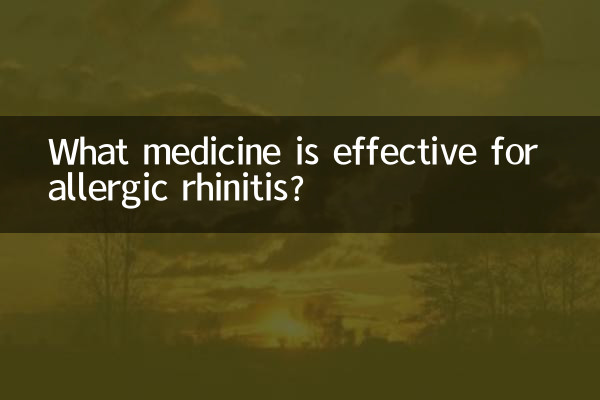What medicine is effective for allergic rhinitis?
Allergic rhinitis is a common allergic disease, mainly characterized by symptoms such as nasal congestion, runny nose, sneezing and nasal itching. With the increase in allergens such as pollen and dust mites in spring, the incidence of allergic rhinitis has also increased. This article will combine the hot topics and hot content on the Internet in the past 10 days to introduce the treatment drugs and their effects for allergic rhinitis.
1. Common symptoms of allergic rhinitis

Typical symptoms of allergic rhinitis include:
If the above symptoms occur, it is recommended to seek medical treatment promptly and choose appropriate drug treatment after a clear diagnosis.
2. Commonly used drugs for allergic rhinitis
According to popular discussions and medical advice on the Internet in the past 10 days, commonly used drugs for allergic rhinitis can be divided into the following categories:
| drug class | Representative medicine | Mechanism of action | Applicable people |
|---|---|---|---|
| antihistamines | Loratadine, Cetirizine | Blocks histamine receptors and relieves allergy symptoms | Patients with mild to moderate allergic rhinitis |
| Nasal corticosteroids | budesonide, fluticasone | Reduce nasal inflammation and relieve nasal congestion | Patients with moderate to severe allergic rhinitis |
| leukotriene receptor antagonist | Montelukast sodium | Block the effects of leukotrienes and reduce inflammation | Allergic rhinitis patients with asthma |
| Decongestant | pseudoephedrine | Shrink nasal blood vessels and relieve nasal congestion | For short-term use, suitable for acute nasal congestion |
| Chinese medicine preparations | Xinqin Granules, Biyankang Tablets | Regulate immunity and relieve symptoms | Patients who prefer traditional Chinese medicine treatment |
3. How to choose the medicine that suits you?
When choosing an allergic rhinitis medication, consider the following factors:
4. Treatment recommendations for allergic rhinitis
In addition to drug treatment, patients with allergic rhinitis should also pay attention to the following:
5. Preventive measures for allergic rhinitis
The key to preventing allergic rhinitis is to reduce exposure to allergens and improve physical fitness:
| Precautions | Specific methods |
|---|---|
| avoid allergens | Reduce going out during pollen season and wear a mask |
| indoor cleaning | Clean the room regularly and use anti-mite bedding |
| diet conditioning | Eat more foods rich in vitamin C, such as citrus and kiwi fruit |
| Enhance immunity | Exercise moderately and get enough sleep |
6. Summary
Although allergic rhinitis is common, symptoms can be effectively controlled with appropriate medication and lifestyle adjustments. Antihistamines and nasal corticosteroids are commonly used treatments, and the specific choice depends on the severity of symptoms and individual differences. At the same time, preventing allergen exposure and enhancing immunity are also important auxiliary means. If the symptoms persist and do not relieve, it is recommended to seek medical treatment in time and seek professional help.
I hope this article can help everyone better understand the treatment methods of allergic rhinitis and get rid of the troubles of rhinitis as soon as possible!

check the details

check the details